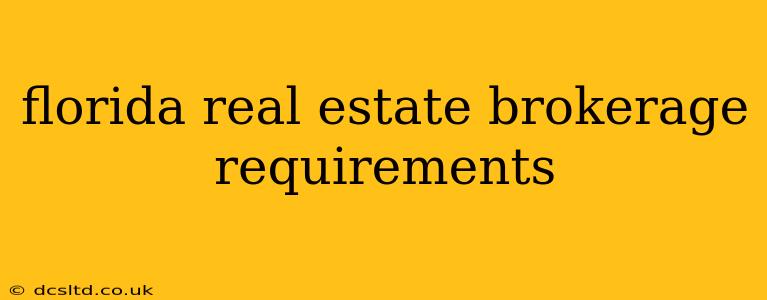Navigating the Florida real estate market requires understanding the intricate regulations governing brokerages. This guide delves into the essential requirements for establishing and operating a successful real estate brokerage in the Sunshine State. Whether you're a seasoned professional looking to expand or an aspiring entrepreneur entering the field, this comprehensive overview will provide clarity and direction.
What are the Basic Requirements to Open a Real Estate Brokerage in Florida?
Opening a real estate brokerage in Florida involves several key steps and adherence to strict regulatory guidelines set forth by the Florida Real Estate Commission (FREC). The process begins with meeting the foundational requirements, including:
-
Broker's License: The most fundamental requirement is possessing a valid Florida real estate broker's license. This necessitates completing the necessary pre-licensing education, passing the state exam, and fulfilling any background check requirements.
-
Business Entity: You must establish a legal business entity, such as a sole proprietorship, partnership, LLC, or corporation. This entity will be responsible for all brokerage operations and liabilities. Ensuring proper registration with the state is crucial.
-
Office Location: A physical office location is generally required, though some exceptions might exist for certain business models. This space must comply with all local zoning and building codes.
-
Errors and Omissions Insurance (E&O): Protecting your brokerage from potential liability is paramount. E&O insurance safeguards against claims of negligence or errors in professional services.
-
FREC Registration: The final step is registering your brokerage with the FREC. This involves submitting the necessary paperwork, fees, and demonstrating compliance with all regulations.
What are the Ongoing Requirements for a Florida Real Estate Brokerage?
Maintaining a compliant and successful brokerage extends beyond the initial setup. Ongoing requirements include:
-
Continuing Education: Florida brokers must complete a specified number of continuing education hours each renewal cycle to keep their licenses active. These courses cover relevant legal updates and industry best practices.
-
Compliance with FREC Rules: Staying abreast of and adhering to the ever-evolving FREC rules and regulations is crucial. Regular review of updates and legal changes is essential.
-
Record Keeping: Meticulous record-keeping is paramount. Brokerages must maintain detailed records of transactions, client interactions, and financial activities, often accessible for FREC audits.
-
Transaction Scrutiny: Each real estate transaction must be handled meticulously, ensuring adherence to all disclosure laws and ethical practices.
What Kind of Insurance Does a Florida Real Estate Brokerage Need?
Beyond E&O insurance, consider other insurance types crucial for safeguarding your brokerage:
-
General Liability Insurance: This covers incidents like property damage or bodily injury occurring on brokerage premises.
-
Professional Liability Insurance (PLI): While similar to E&O, PLI offers broader coverage for professional errors. Consult with an insurance professional to determine the most suitable coverage.
-
Workers' Compensation Insurance (if applicable): If you employ others, workers' compensation insurance is mandatory in Florida, protecting employees from workplace injuries.
How Much Does It Cost to Start a Real Estate Brokerage in Florida?
The cost of starting a Florida real estate brokerage varies greatly depending on several factors:
-
Location: Rent or purchase costs for office space differ significantly across Florida.
-
Size and Scope: A larger brokerage with more staff will naturally incur higher costs.
-
Technology Investments: The cost of software, marketing tools, and other technology varies considerably.
-
Legal and Professional Fees: Legal counsel and other professional services contribute to overall expenses.
Therefore, it's impossible to provide a single definitive cost. Thorough budgeting and financial planning are essential before launching your venture.
What are the Responsibilities of a Florida Real Estate Broker?
Florida real estate brokers shoulder significant responsibilities:
-
Compliance: Ensuring complete adherence to all FREC rules, regulations, and laws.
-
Supervision: Overseeing all brokerage activities and ensuring ethical conduct by all associated licensees.
-
Training: Providing ongoing training and support to sales associates to maintain professionalism and compliance.
-
Record Keeping: Maintaining accurate and accessible records for all transactions and activities.
-
Client Protection: Prioritizing client interests and ensuring fair and transparent dealings.
This detailed guide aims to provide a comprehensive understanding of the requirements for operating a Florida real estate brokerage. Remember, consulting with legal and financial professionals is strongly recommended throughout the process. The information here is intended for informational purposes only and should not be considered legal advice.
